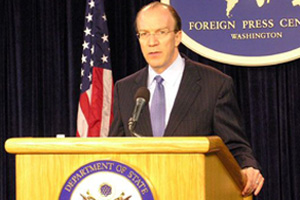During a hearing of the Commission on Wartime Contracting earlier this week, Chris Shays got so exercised over the Justice Department’s intransigence that he may have momentarily forgotten that the panel he co-chairs doesn’t have subpoena power. He threatened to use it anyway to compel the agency to deliver up information that Shays, a former GOP congressman from Connecticut, says it has been stonewalling on for months.
Starting in December, the commission has repeatedly sought data from Justice on contracting corruption-related cases and prosecutions. That information—bringing together data from a collection of federal agencies and divisions—is contained in a database administered by an interagency law enforcement unit known as the International Contract Corruption Task Force.
“I can’t for the life of me understand why Justice would be reluctant to share statistics unless they don’t like what the statistics say,” Shays fumed. He added, “I don’t get the feeling that we are getting the kind of cooperation that we need to get from Justice.” The agency later promised to provide the information, according to a commission spokesman, but another member of the panel, Charles Tiefer, has complained that the agency has impeded their work in other ways, including by blocking access to closed case files and denying interviews with the investigators who worked them.
Withholding data and access has not been the Justice Department’s only affront, according to Shays. When he and the contracting commission’s general counsel attended a conference in late March that brought together federal personnel on the front lines of the effort to crack down on contracting fraud and corruption, Shays says Justice Department representatives made it clear that their presence was unwelcome: “We were told that Justice was uncomfortable that we were present and that it would impede their being candid at the conference, so we left.” (A Justice Department spokeswoman did not respond to a request for comment.) Says Justice Department spokeswoman Laura Sweeney: “As has been the practice at this conference in previous years, non-law enforcement guests were invited for specific sessions to make presentations and discuss matters of mutual interest, but all other sessions were designated for law enforcement only. This is done to encourage a full and free exchange of views and information that might involve discussion of confidential or sensitive law enforcement information. We continue to work cooperatively with the Commission to provide the information we can regarding their questions.”
Among commission members, there appears to be a consensus that the government is not doing nearly enough to prevent fraud or punish the perpetrators that are ripping off taxpayers to the tune of billions of dollars. “We probably are not catching most of what’s going on,” commission member Dov Zakheim, the Pentagon’s comptroller during the first half of the Bush administration, remarked earlier this week. And some members of the commission have called into question the Justice Department’s commitment to prosecuting contracting-related fraud and corruption cases. “It’s not a priority of DOJ’s because they have lots of priorities,” said Shays.
Indeed, since 9/11 the FBI has shifted significant manpower and resources to the counterterrorism side of its operation. During that time, according Kevin Perkins, the assistant director of the bureau’s criminal investigative division—the branch responsible for, among other things, investigating contracting corruption—has lost 2,000 agents, approximately a third of its manpower. “We focus our efforts on only the highest dollar items,” he said, adding, “obviously, something had to give.”
But in the contracting arena, zeroing in on just the high dollar cases could be the wrong calculation. Warzone crooks who bilk the government of comparatively small amounts of money can potentially put the lives of US troops, civilians, and contractors in just as much jeopardy as those who steal larger sums. Just the same, federal inspectors general have acknowledged difficulties in getting the Justice Department to take up certain contracting cases, which, in addition to being difficult and dangerous to investigate are highly complex. “My perception is they have a lot of priorities and the dollar amounts in our cases are not necessarily the highest,” Ginger Cruz, a senior official with the office of the Special Inspector General for Iraq Reconstruction (SIGIR), told the contracting commission Monday. As Shays put it, “You have to be a salesman to Justice in order to get them to prosecute.”
In order to improve its success rate with the Justice Department, starting six months ago SIGIR took the unusual step of hiring three seasoned ex-federal prosecutors and embedding them in the agency’s criminal division to work exclusively on its cases. It’s a novel approach, but it also suggests the lengths contracting fraud investigators need to go to move their cases along.
“The bottom line is that fraud and abuse pays most of the time in contingency contracting,” Shays said. “You can get away with it. Some are investigated, few are prosecuted.”
Corrupt contractors and government personnel have surely caught on. Cruz recalled paying a jailhouse visit to Robert Stein, once the Coalition Provisional Authority’s comptroller in Iraq, who’s currently serving 9 years in prison for a massive fraud scheme that siphoned more than $8.6 million from the reconstruction effort in Iraq. Stein was then on suicide watch and remorseful for his crime, and Cruz asked why he had done what he’d one. “He looked at me and said, ‘You know, if there had been someone there, if I knew that someone was looking, I probably would have thought twice.”
The moral of the story, according to Cruz: “The deterrent effect doesn’t exist unless there’s a possibility that someone’s going to get you.”















